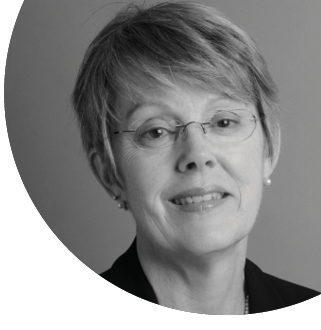DEPARTMENTS

PRESIDENT'S MESSAGE
Dr. Alice Hamilton: An IH Luminary
BY DEBORAH IMEL NELSON, AIHA PRESIDENT
Alice Hamilton was the founder of industrial medicine in the U.S., the first woman professor at Harvard University, and the first author of Hamilton and Hardy’s
Industrial Toxicology
. I just finished reading Dr. Hamilton’s autobiography, Exploring the Dangerous Trades
, published in 1943. Not only does it relate her early work in researching the hazards of occupational exposure to lead, explosives, carbon monoxide, mercury, silica, solvents, and others, it paints a picture of a woman who was passionately involved in the social and political issues of her day.
PASSION AND DEDICATION
As a young medical school graduate, Dr. Hamilton went to live at Jane Addams’ Hull House in Chicago, where she spent the next 22 years. Living near Italian, Polish, Hungarian, Bulgarian, and Serbian families, she became aware of the health issues arising from crowded conditions, poverty, lack of knowledge, and poor working conditions. She learned of the risks of industrial work, the limited responsibility taken by employers of that era, and the immigrant workers’ lack of power to improve their working conditions.
Dr. Hamilton’s 32-year career in industrial medicine began in 1910 when she was asked to investigate the dangerous trades of Illinois. Her autobiography documents significant improvements in working conditions during that time, including the introduction of workers’ compensation laws, employers’ greater acceptance of their responsibilities to employees, and the beginning of engineering controls to reduce exposure to industrial contaminants.
Before reading
Exploring the Dangerous Trades
, I hadn’t realized the extent to which Dr. Hamilton embraced social and political causes, such as women’s rights and the peace movement. You may not agree with her social and political views, but we can all admire her passion and dedication to the causes she supported.
OPPORTUNITIES FOR ADVOCACY
In the spirit of Dr. Hamilton’s contributions, I challenge each of us to do what we can to promote the causes we believe in. If you have limited time for volunteer activities, you might consider writing letters to your Congressperson or Senator advocating for worker protection. If you have more time and energy, you might join a voter registration campaign or volunteer for a social or environmental cause. AIHA offers several opportunities to make a difference.
You may not agree with her social and political views, but we can all admire her passion and dedication to the causes she supported.
DEBORAH IMEL NELSON, PhD, CIH,
is president of AIHA. She can be reached at (720) 587-7500 or via email
.Formed in June, the AIHA Government Relations Beta Group is now one of our largest volunteer groups. Members develop specific legislative and regulatory public policy proposals. Four task forces have already been formed: Government Funding Accountability, Safe Patient Handling and Mobility, Safety Matters/Teen Workplace Safety, and Marijuana Worker Health and Safety. Contact Mark Ames, AIHA’s director of Government Relations, via
email
or phone at (703) 846-0730, or sign up on AIHA's website
. In another exciting development, the Women in IH focus group was initiated at AIHce EXP in Seattle. We recognize that while women can bring a fresh perspective, approachability, listening skills, and relationship building to the practice of IH/OEHS, that singularity offers several challenges as well. This group, which is not limited to women participants, provides a forum for conversations on the unique challenges of women in the IH/OEHS field, and guidance on effective communications, decision-making processes, and that elusive work/life balance we all seek. For more information,
email Laurie Mutdosch
, senior manager of Membership and Professional Community, or call her at (703) 846-0735.
Another great opportunity to get involved is Safety Matters. You’ll be seeing more about this program to prepare teen workers for their first jobs. In the meantime, check out the
Safety Matters Training Program
.These opportunities remind us that our profession seeks not only to protect workers but to improve their lives. In this effort we have no better role model than Dr. Hamilton, who described her work, in words that also apply to our own, as “scientific only in part, but human and practical in greater measure.”

